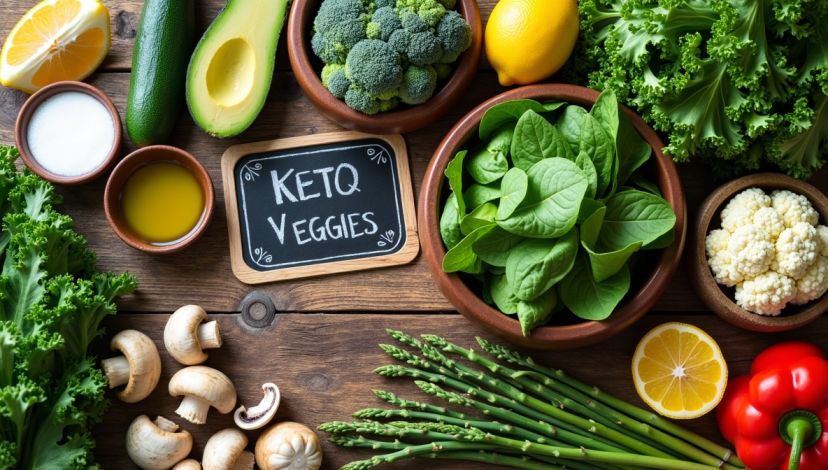What Vegetables Are Keto Friendly: Best Low-Carb Veggies to Try

It is not easy to start and continue with a ketogenic diet. The challenge would be the selection of the right vegetables. Although vegetable often lack carbohydrates, their main role in the diet is to supply fiber, vitamins, and minerals that are needed and vegetable is an abundant source of several of them are rich in carbohydrates, which may interfere with ketosis. Which are the keto-friendly vegetables, then? It is important to know what vegetables can be included in the keto lifestyle to succeed.
Table of Contents
- Which vegetables are most suitable for Keto? Getting to Know the Best Low-Carbs
- A Comparison of the Keto-Friendly Vegetables: An Insight into Carbs and Health Advances
- Tips and Tricks of Introducing Keto-Friendly Vegetables Into Your Food
- Starchy vegetable foods to avoid on Keto: what foods to avoid and why.
- Trends and Nutrition Keto Vegetables of the Future
- Conclusion: Be Keto-Friendly: Embrace the Best Vegetables to be Healthier Now
- FAQs
Keto-friendly vegetables are usually low carb (the quantity of carbs that were not counted in carbs, such as fiber) and exploded with nutrients. The veggies enable you to remain within the daily carb ratio in the meals and they also help in ensuring that the meals that one takes are interesting and nourishing. Either you just started using keto or are seeking to perfect your diet, the best vegetables to use can make the complete difference.
Key Takeaways:
- Vegetables that are keto-friendly contain few net carbs and are rich in fibers, vitamins, and minerals.
- The best keto choices are non-starchy, leafy greens, and some cruciferous vegetables.
- Keto diets can add more flavor, variety, and vice with the incorporation of these vegetables to increase the intake of nutrients.
Which vegetables are most suitable for Keto? Getting to Know the Best Low-Carbs
The response to wondering about what vegetables are keto friendly is the concentration of carbs it has and its nutritive worth. Low net carbs per 100 grams (often less than 5 grams per 100 grams) will make them the best keto vegetables because they will help you to control your carb intake.
The most favorite keto vegetables are:
- Spinach: low-carb and an extremely rich source of iron and antioxidants. Just ideal in salads sauté, or smoothies.
- Asparagus: approximately 2 grams net carbs, awesome steamed or roasted with butter or hollandaise sauce.
- Cauliflower: 3 grams net carbs, can be used as a substitute for rice, mashed potatoes, or pizza crust.
- Zucchini: 3 grams of net carbs, it is great to spiralize into noodles or to use it to make low-carb fries.
- Broccoli: This way, there are 4 grams of net carbs per serving; broccoli is fibrous and rich in vitamins and tastes great when steamed or roasted.
- Cabbage: 3g net carbs; it is excellent in stir-fries or used to make keto coleslaw.
- Avocado: It is a fruit, but at the same time, it is keto-friendly and contains 2 grams of net carbs and 33 grams of healthy fats.
Not only are these low-carb vegetables, but they also contain important nutrients contributing to overall health on keto. As a case in point, spinach and kale are sources of magnesium and vitamin K useful to bone health and metabolism.
Real-life application:
Nutritionist Dr. Emily Stone advises beginning your keto vegetable by adopting leafy greens such as spinach and kale as they are nutrient-rich, have low carbohydrates, and can be easily added to the meals. She points out, that a small addition of spinach to your breakfast omelet can increase the levels of fiber and micronutrients but you are not taking any risks with your ketosis.
A Comparison of the Keto-Friendly Vegetables: An Insight into Carbs and Health Advances
Here is a comparison table of the most popular keto vegetables regarding their net carb count and nutritional facts in order to guide you when making the right decisions:
| Vegetable | Net Carbs (per 100g) | Key Nutrients | Keto Use Tips |
| Spinach | 1g | Iron, Vitamin K, Antioxidants | Raw in salads, sautéed, in smoothies |
| Asparagus | 2g | Folate, Vitamin C | Roasted, steamed, with hollandaise |
| Cauliflower | 3g | Vitamin C, Fiber | Cauliflower rice, mash, pizza crust |
| Zucchini | 3g | Vitamin A, Potassium | Spiralized noodles, fries |
| Broccoli | 4g | Vitamin C, Fiber | Steamed, roasted, in casseroles |
| Cabbage | 3g | Vitamin C, Fiber | Stir-fries, coleslaw |
| Avocado | 2g | Healthy fats, Potassium | Sliced, mashed, in guacamole |
Table 1: The Best Vs. the Worst Keto-Friendly vegetables According to the Net Carbs and Nutritional Value
ALT text: table of comparison of net carbs and nutrients of keto-friendly vegetables.
This table reveals that a majority of keto vegetables are not starchy and they have fiber which aids in decreasing net carbs and digestion. By covering multiple these vegetables in your diet, you will receive a wider range of nutrients besides the carbs limit.
Tips and Tricks of Introducing Keto-Friendly Vegetables Into Your Food
Knowing what vegetables are keto friendly is just the start. The second thing is how to make and consume them in a manner that will keep your keto meals interesting and enjoyable.
- Substitute with the help of vegetables: Cauliflower rice/mash instead of normal rice or potatos. Vegetable noodles are in lieu of pasta.
- Roast or grill: Broccoli, Brussels sprouts, or asparagus cooked with olive oil and spices are becoming more delicious and have a taste.
- Add high-quality fats: Butter, olive or avocado oil help add more fat to any vegetable and also provide satiety.
- Blend into food: Throw either chopped spinach or kale in omelets, casseroles or even soups to get the additional vitamins and minerals.
Note: to track how many carbs you have consumed make a habit of measuring the size of your vegetable portions and pay close attention to not going over the maximum caused by a simple lack of concentration.
Expert Insight:
Mark Jensen, a chef who loves keto, insists that fat pairing is essential: he says vegetables are best when accompanied by fats, such as butter or avocado oil, which do not only enhance taste but also aid fat-soluble vitamin absorption by your body.
Starchy vegetable foods to avoid on Keto: what foods to avoid and why.
Although vegetables are usually healthy it is often too high in carbohydrates to be part of a ketogenic diet. Starchy vegetables actually have higher levels of sugars and carbs that can easily accelerate and get you out of ketosis.
Vegetables, which are usually avoided because they are starchy, are:
- White, sweet, and red potatoes
- Corn
- Peas
- Carrots (in excess quantities)
- Butternut and pumpkin
- Parsnips
Such vegetables contain a high concentration of more than 7 grams of net carbs per 100 grams, thus not being keto-friendly.
Comparison Table: Starchy vegetables vs. vegetables in the keto diet
| Vegetable | Net Carbs (per 100g) | Keto Friendly? | Common Uses |
| Potato | 15g | No | Mashed, baked, fries |
| Sweet Potato | 17g | No | Roasted, mashed |
| Corn | 19g | No | Boiled, grilled |
| Carrots | 7g | Limited | Raw, roasted (small amounts) |
| Butternut Squash | 8g | No | Soups, roasted |
| Cauliflower | 3g | Yes | Rice, mash, roasted |
| Zucchini | 3g | Yes | Noodles, fries |
The table 2 contains the comparison of starchy and keto-friendly fruits and vegetables according to their net carbs.
ALT description: Table of comparison of the content of carb in starchy vegetables and keto friendly vegetables.
By steering clear of the vegetables that are high in carbs, you can adhere to the state of ketosis and proceed to turn additional fat into energy. Rather, make use of the low-carb ideas provided above to assure you of the best outcomes.
Trends and Nutrition Keto Vegetables of the Future
There are increasing options of near limitless vegetables keto friendly and keto recipe as the keto diet is expanding in popularity. Food scientists and nutritionists are examining how to improve the nutritional composition of the vegetables on the keto diet via breeding and preparation practices.
Specifically, a study demonstrates that eating a wide selection of low-carb veggies may be beneficial in terms of gut health and so does lowering inflammation which is significant to the long-time benefits of your wellbeing on a keto diet. There is also the emergence of the keto meal delivery services and keto recipe blogs, so it is easier than ever to get tasty keto meals packed with nutrients.
Note: Proper balance of your vegetables taking with healthy fats and proteins will help you to stay on ketosis and your general health.
Conclusion: Be Keto-Friendly: Embrace the Best Vegetables to be Healthier Now
Understanding what vegetables are keto friendly empowers you to make smart food choices that support your ketogenic lifestyle. Vegetables such as spinach, asparagus, cauliflower and zucchini are low-carb vegetables, supplying important nutrients but not interfering with ketosis. Regardless of starchy vegetables and with a range of keto-friendly choices, you will have delicious, fulfilling meals that help you lose fat and stay healthy on a regular basis.
Then, you can start introducing these vegetables into your favorite dishes and do not forget about combining them with good fats to make them more beneficial. To get additional keto tips and recipes please see our Healthy Lunch Ideas for Weight Loss.
FAQs
Q1: Which are the low carb vegetable options on keto?
A: Lettuce, spinach and asparagus are some of the best low-carb vegetables, and their net carbs are usually less than 2 grams per 100 grams.
Q2: Is it possible to consume tomatoes in a keto diet?
A: Yes, tomatoes can be used during the keto diet and about 100 grams contains 3 gram of net carbohydrates.
Q3: Do avocados count as vegetable on keto?
A: Avocados are technically a fruit, but about keto, it has low net carbs and because of the abundance of good fat they are keto-friendly.
Q4: Why is keto bad on starchy vegetables?
A: starchy vegetables consist of high net carbs that may cause disturbances of ketosis and prevent fat burning.
Q5: How can I add more keto vegetables to my meals?
A: Use cauliflower rice, zucchini noodles, and leafy greens in salads, stir-fries, and side dishes to boost vegetable intake.
Latest Posts
You Might Also Like

Chipotle Nutrition – Your go-to guide for calories, healthy choices, and balanced meals at Chipotle.
TOP NEWS
© Copyright 2026 Chipotle Nutrition. All rights reserved














No Comments